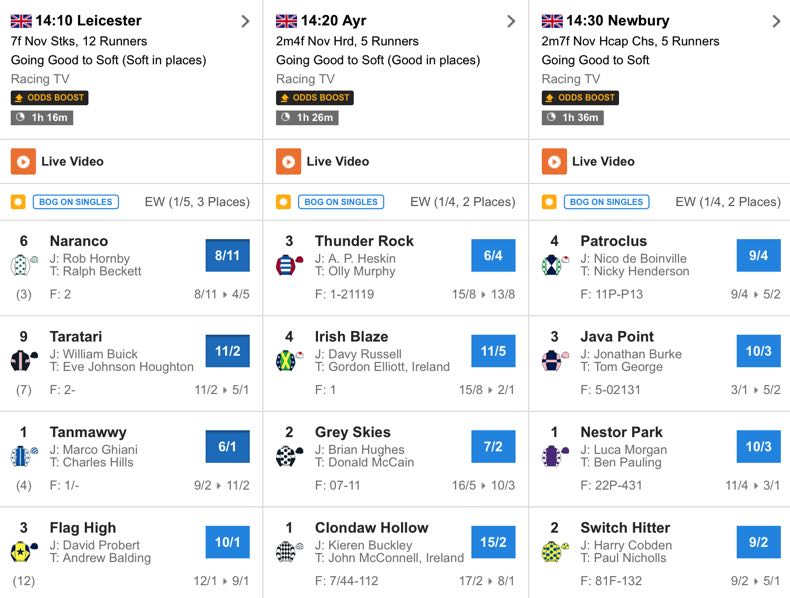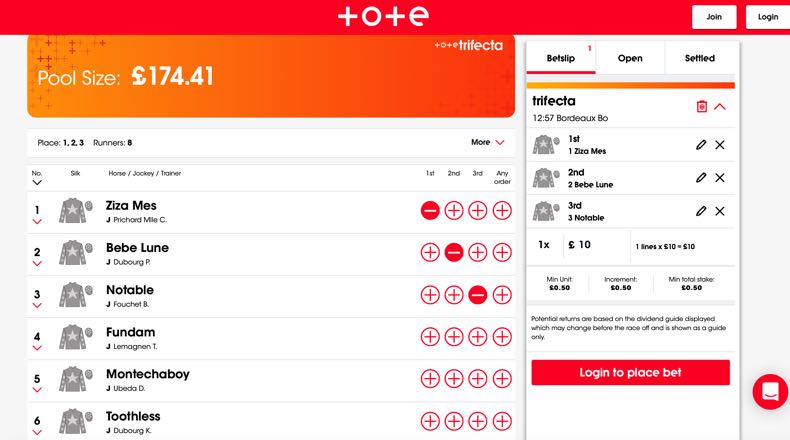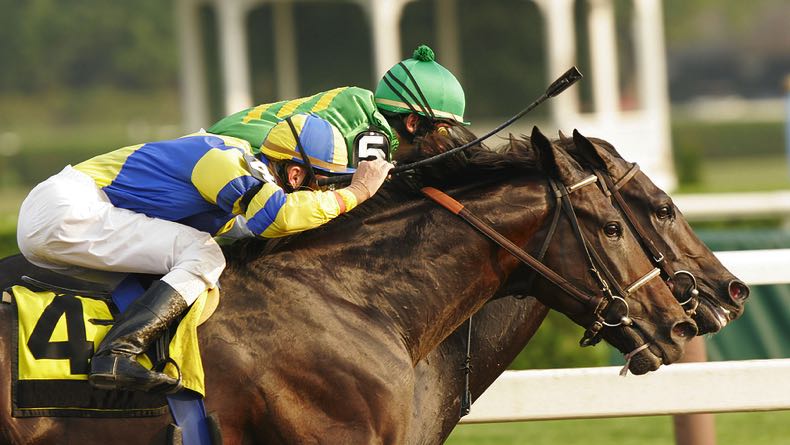 There are so many different betting options when it comes to horse racing. Whilst most punters stick to straightforward win singles and each way bets, there are many other choices for which a bettor might opt. One of the more interesting ones involves trying to predict the first three runners home in a given race. Such a bet can be made on the greyhounds too whilst, theoretically, very similar wagers can also be made on motorsports, such as F1, and even sports, such as football or rugby.
There are so many different betting options when it comes to horse racing. Whilst most punters stick to straightforward win singles and each way bets, there are many other choices for which a bettor might opt. One of the more interesting ones involves trying to predict the first three runners home in a given race. Such a bet can be made on the greyhounds too whilst, theoretically, very similar wagers can also be made on motorsports, such as F1, and even sports, such as football or rugby.
In general terms, a tricast may be used to describe this bet in the wider sense, by which we mean any prediction of the top three finishers in a given event may be called a tricast. However, for the purpose of this article, when we talk about a tricast we are talking about such a wager that is settled in accordance with the tricast dividend. If all that sounds a tad confusing, just read on as we attempt to ease any confusion as we explain the difference between a tricast and a trifecta. We’ll also look at what happens in the event of things, such as a non-runner and we’ll give information about some related alternatives to these bets. Last of all, and perhaps most crucially, we will try to discover whether a tricast or a trifecta is the better bet.
What Is a Tricast?

We have another feature that looks at the differences (and similarities) between a forecast and an Exacta and reading that will give you a lot of information that is also relevant to the matter at hand here. Whilst those two bets involve predicting first and second (in the correct order) in a race, a tricast, as the name suggests, entails going a step further and correctly predicting which horses (or other selections) will come first, second and third – in the exact order.
Guessing the Top Three Order at a Non-Tote Bookie
As we have said, in general terms a tricast may refer to any such bet but more specifically, and as discussed in this piece, it means such a bet placed in the traditional way at a non-tote bookie. This means that the winnings are calculated using a computer algorithm and a winning punter will not find out what they might win when placing the bet; they will only find out what they have won after the race has finished.
“Tricasts” in the wider sense may be placed on other sports but these will generally be made as fixed odds bets in specials markets or very specific markets. In Formula 1, for example, you may see a market for “Podium in correct order” or similar, which is tantamount to an F1 tricast. Or the Premier League may have a similar market based on who will finish first, second and third in the table at the end of the season.
Most Popular in Horse & Greyhound Racing
However, when it comes to tricasts that are calculated after the event using the pre-set formula (which is centrally declared and the same no matter which bookie you use), horse racing and greyhound racing are the only sports available. We explain more about how the winnings for such a bet are calculated in our article entitled What Is a Computer Straight Forecast & How Is It Calculated? That article looks at a forecast bet, which is identical to a tricast but relates only to the top two, rather than the top three.
Algorithmic Formula
The formula to calculate winnings for both bets is fundamentally the same and looks at a wide range of factors, using complex maths to try and work out what a fair payment should be. The key numbers and factors entered into the formula are the odds of the horses occupying the first three places, the prices of the other runners, in particular the favourite (if they are outside the first three), draw bias and the type of race.
Odds Play a Big Factor
Obviously the odds are the biggest influencing factor. A race in which the favourite is chased home by the second and third favourites will always produce a lower payout than one where the first three are priced at respective odds of 50/1, 20/1 and 66/1. Winnings from tricasts are declared as a figure in pounds sterling, often referred to as the dividend. This is the official Computer Tricast and indicates what your returns would be based on a stake of £1. So. if the Computer Tricast is declared as £412.34 and you bet £5, your return would be £2,061.70.
Not Widely Available
Whilst forecasts are available on almost all races (typically as long as the contest has at least three runners), tricasts are not as widely available. According to one leading bookie, “Tricasts are offered on all handicap races (and occasionally other races) where there are eight or more declared runners on the proviso that at least six run.” In addition, it is generally offered in most greyhound races with at least six runners. In reality, this means most dog races, given that contests generally have six dogs unless there is a non-runner.
Computer Tricast
When it comes to the availability of a Computer Tricast on the horses, however, we are not 100% sure of the truth of what the abovementioned bookie says. Looking at the results of many races, it appears some contests that should be eligible do not have a declared Computer Tricast, for whatever reason. Where a tricast is available before a race it will be shown as one of the markets under the race. Some bookies offer fixed odds tricasts and these will list pre-selected groups of three horses that can be backed, either in a particular order (a fixed odds straight tricast) or at shorter odds in any order (a fixed odds combination tricast).
However, for the sort of bet we are discussing here, based on the Computer Tricast declaration, you need to navigate to the market and/or use a bookie, that allows you to make your own pick of three horses from all available runners. These are picked in the specific first, second, third order (unless you opt for a combination bet, of which more later). You simply tick the horses that you predict will fill the first three places, select a single stake which covers the whole bet and then cross your fingers. If your three picks come home exactly as you predict, the Computer Tricast will be declared shortly after the result.
What Is a Trifecta?

A Trifecta is exactly the same bet as a tricast but the winnings are calculated very differently. Again, this is something we look at more in both a previous article we have mentioned, about Forecasts and Exactas. However, if you haven’t read that, or don’t want to, we will explain again, albeit with a little less detail, how bets like Exactas and Trifectas and indeed all pool-based bets work.
Guessing the Top Three Order at the Tote
In the UK, a Trifecta is a tote bet offered at their kiosks at race tracks, via their own site and also through tote-affiliated bookies who essentially match the tote payment. It is a pool bet, which means that what you win is determined by how much was bet on the market and what proportion of those bets won.
As with a Computer Tricast, punters will only find out what their returns are after the race. The total pool (all the money wagered on the Trifecta) is subject to a cut from the bookie to cover their costs and profit (this is 25% of the pool for UK races and 30% for those regulated by Horse Racing Ireland). The remainder is then split between those who backed the right trio of horses. It is split according to their stake and is declared in the same way as the Computer Tricast, as a dividend based on a £1 stake.
Returns Calculated Much Differently
In one sense the two bets we are looking at in this feature are identical. You pick the first three in a race, in the right order, and only find out your winnings after the race. However, as well as differing in how the returns are calculated, another key difference is that the Trifecta is far more widely available, at least in terms of the races.
Whilst it may not be offered by all bookies, it is available for almost every race, in contrast to tricast bets. Tote themselves state that: “The Tote Trifecta pool is operated in all UK races with 3 or more declared runners unless otherwise stated.” From experience and from looking back at results, we can confirm that this is indeed true.
Trifecta Meaning in Other Countries Varies
One other thing of note, as if all this terminology and different bet types wasn’t enough, is to note that in the US, a Trifecta has a different meaning. This is unlikely to be an issue for any UK punters but in case you happen to read an American publication, or speak to someone from North America, it may be worth knowing.
In the USA, the term Trifecta simply means the same as tricast, when that second term is used in the general sense. In other words, to Americans, a Trifecta is simply any bet on the first three participants in a contest in the right order. In Canada, this is referred to as a triactor, whilst in Australia, it is also called a Trifecta. Note that in some of these countries parimutuel betting (pools betting) is the only form of gambling available, or is at least the most prevalent.
How About Non-Runners & Dead Heats?

When it comes to non-runners and dead heats there is a whole range of scenarios to consider. As well as all the various possible eventualities, it is worth noting that many of them are treated differently according to whether you placed your bet as a Computer Tricast or as a pool-based Trifecta. In addition, some betting sites treat things differently, so we would recommend checking the terms and conditions of the site where you made the bet. Alternatively, if you are unsure about why a wager has settled in a certain way, simply get on live chat and ask your bookmaker’s customer service team.
Non Runners: Bet Voided & Stake Returned
That said, when it comes to tote bets there is just one set of rules. Once horses come under starter’s orders, bets will stand. Should one of your three horses be declared a non-runner prior to that, your bet will be voided and the stake returned. Equally, if non-runners mean the field size drops below three, all bets will be void and the same will apply if an entire meeting is cancelled, abandoned or postponed such that the race is not run on the same day.
Dead Heat: Varies
When there is a dead heat for any of the relevant places, the pool is divided into as many different sub-winning-pools as there are winning combinations. This is where things get rather complicated, so check out the tote site for more info. Last of all, should no horses finish the race, all bets are voided, whilst if only one or two finish, bets will be settled with a dividend for that number of horses and other places filled with “any other runner”.
No Tricast Declared
Some of these rules are the same when it comes to Computer Tricast bets but there is more variation between bookies. One obvious difference is the possibility that no Tricast is declared, whether because it was accepted in error, non-runners reduced the field size beneath the minimum or there were insufficient finishes. In this case, most bookies will settle the bet as either a Computer Straight Forecast or a win single (depending on numbers), or alternatively they will void the bet.
Varies by Bookie
In the event of a non-runner within your selected three horses, some bookies will settle on the remaining two as if you had placed a forecast, whereas others will void the bet. The same applies if two of your three become non-runners and some sites might void whilst others may allow the bet to stand as a single.
Last of all, when it comes to dead heats, standard dead heat rules, such as they apply, will be used. This is largely similar to the rules used by tote, with separate (and smaller) dividends being declared for each of the winning combinations.
Combination Tricasts & Trifectas
When it comes to bets involving the first two horses you can place a reversed bet, which is essentially two bets rolled into one. Your stake is doubled so that it doesn’t matter which way round your two horses finish (though the payout will vary). So, one stake will, for example, go on Blue Boy first, with Golden Girl second, whilst another stake will reverse that and back Golden Girl to beat Blue Boy to the line.
With Tricasts/Trifectas, the equivalent is a combination bet, which essentially does the same but covers all possible combinations of the three horses. If we call the horses A, B and C, you can see that the following bets are needed to cover all eventualities (should those three finish in the top three):
- ABC
- ACB
- BAC
- BCA
- CAB
- CBA
Whichever system you use to make your bet, a basic combination where you are picking three horses in any order to make up the top three will consist of six bets. As such, a £10 combination tricast will cost £60 in total. However, given the difficulty of calling the first three, even in any order, it is not uncommon for fans of this bet to include more horses. In simple terms, for example, you might pick four, five or six horses and say that any three from them will finish on the “podium”, in any order.
This is, of course, far easier than landing three from three but all the extra horses create extra possible combinations and the total stake needed can quickly add up.
- 4 selections = 24 bets
- 5 selections = 60 bets
- 6 selections = 120 bets
With each bet requiring a separate stake, a £10 combination tricast (or Trifecta) that uses six horses would set you back a massive £1,200!
Which Is Better, Tricast or Trifecta?

Given the bets are essentially the same in terms of the prediction you are making and what needs to happen in order to win, the obvious question is which is the better option. We look in more detail at this when comparing forecasts and Exacta bets but before we compare the returns of tricasts and Trifectas, let us reiterate one advantage of the latter that we have already mentioned – they are available on far more races. If you are a fan of this bet then there are times that a Trifecta will be your only option so the point will be moot.
Experts Say the Trifecta Is the Better Way to Go
However, where you do have the choice, which will put more cash in your pocket if you win? Well, in short, it varies, sometimes the tricast will and sometimes the Trifecta will and there is no certain way of knowing ahead of the results. There are many complex variables at play but on balance, it seems that experts who have looked into this in far more depth than we have the mathematical nous to be able to do, have concluded that the Trifecta is the better way to go.
A Random Sample of 10 Races Chosen at Random
However, just to check for ourselves, we have picked 10 races at random and compared the returns (based on a £1 stake) for both. This is a small sample but, nonetheless, let’s see who wins the Tricast v Trifecta battle!
| Race | Computer Tricast | Trifecta |
|---|---|---|
| 15.30 Cheltenham (17/3/22) | £174.08 | £133.80 |
| 15.05 Hexham (17/3/22) | £111.50 | £233 |
| 14.50 Cheltenham (17/3/22) | £40.43 | £31.60 |
| 14.35 Down Royal (17/3/22) | £2,950.72 | £4,490.50 |
| 14.10 Cheltenham (17/3/22) | £4,615.49 | £6,976.20 |
| 13.30 Cheltenham (16/3/22) | £57.25 | £40.50 |
| 14.10 Cheltenham (16/3/22) | £81.46 | £135.90 |
| 16.10 Cheltenham (16/3/22) | £161.74 | £253.30 |
| 16.50 Cheltenham (16/3/22) | £673.41 | £1,675.40 |
| 19.30 Kempton (16/3/22) | £2,868.25 | £2,748.50 |
Whilst many of these races are from the 2022 Cheltenham Festival, they were picked at random. We simply went for the first 10 races we saw where a Computer Tricast was declared, with a few random ones thrown in so they were all from the same day or meeting.
As said, 10 races is a small sample and it is not representative of UK racing in terms of the type of race, the bias at the tracks and quite probably the odds of the winners. Certainly, we can see from the payouts listed above that quite a few of the winning and placing horses must have been at long odds too (though this would not be uncommon with handicaps of medium to large fields).
Trifecta Delivers Bigger Payouts in Our Small Sample
However, even with a cursory glance is clear that the Trifecta, as we suspected it would, delivers bigger payouts than the tricast. It would have paid out more in six of the 10 races we looked at which, by itself, would not be especially impressive, especially given the small sample.
However, if we imagine two brothers who both place exactly the same bets but one prefers tricasts whilst the other favours the tote-based Trifecta, the difference in outcomes would have been huge based on these 10 races. The first brother would have won around £11,734 from 10 winning £1 tricasts. His Trifecta-favouring sibling, however, would have come out with closer to £16,720. That is almost £5,000 more, which buys a lot of fraternal bragging rights, and is also over 42% more than the tricast bets would have won in total.
Admittedly, these stats are somewhat skewed by two huge payouts, although it is worth noting that on a third payout where a four-figure dividend was paid by both, it is actually the tricast that paid more. What is more telling, perhaps, is that in general, when the Trifecta paid more, it tended to pay a lot more, whereas when the roles were reversed the difference was far less marked.
The best result for the tricast was when it paid £57.25 in comparison to £40.50 on the Trifecta. That was a 41% boost, whilst in the first race it paid £174.08, compared to £133.80, which represented about a 30% superiority, whilst a similar outcome occurred in the third race (£40.43 versus £31.60).
Trifecta: Better Availability, Bigger Returns Overall
However, in the second race the Trifecta paid over 100% more, over 50% in the fourth race, the fifth and the eighth race. It was almost 67% better in the seventh compared contest and in the ninth race, it did the best of all, producing a massive dividend of £1,675.40 – almost 150% of the tricast’s total.
So, all in all, we think it is probably safe to say that any casual punter would be best off choosing the pool-based Trifecta. As well as being available on more races, it often delivers payouts that the tricast just can’t get near. Whilst a super-serious fan of this type of bet may be able to spot conditions under which the tricast might be likely to fare better, for most people the Trifecta is the better option to choose.
